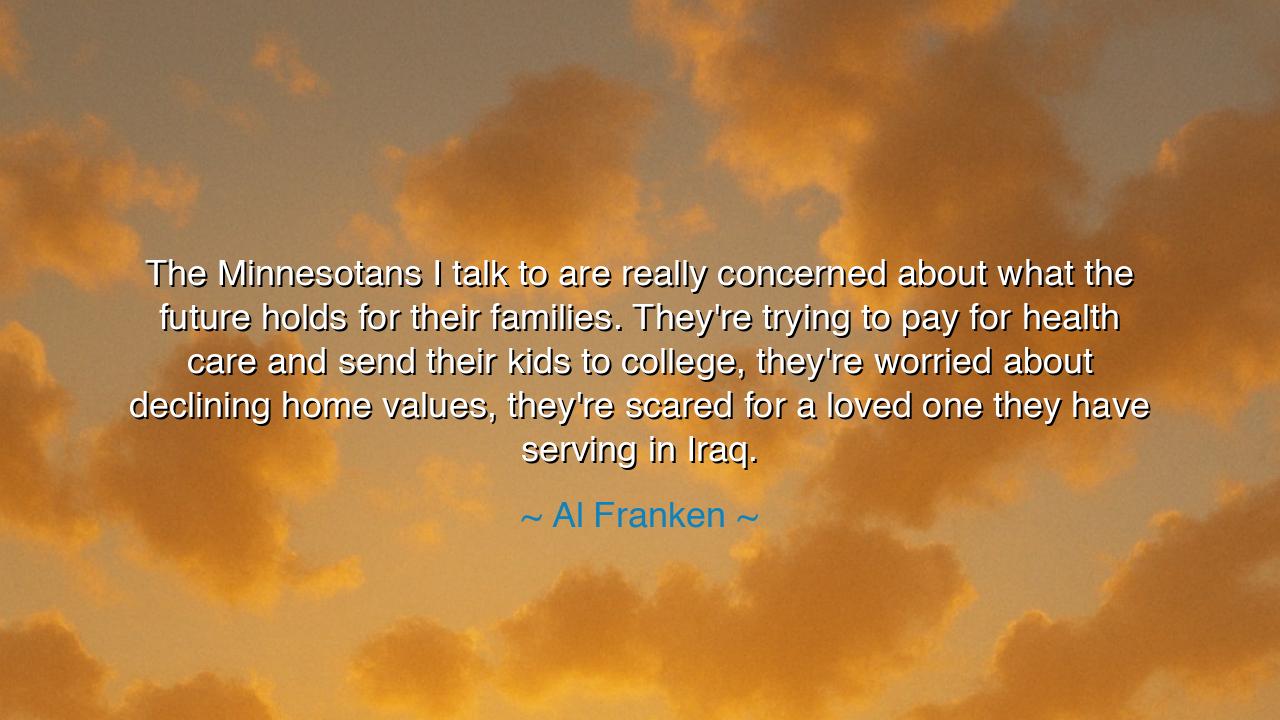
The Minnesotans I talk to are really concerned about what the
The Minnesotans I talk to are really concerned about what the future holds for their families. They're trying to pay for health care and send their kids to college, they're worried about declining home values, they're scared for a loved one they have serving in Iraq.






“The Minnesotans I talk to are really concerned about what the future holds for their families. They're trying to pay for health care and send their kids to college, they're worried about declining home values, they're scared for a loved one they have serving in Iraq.” Thus spoke Al Franken, not merely as a senator or statesman, but as a voice for the common soul of his people. In these words lies a reflection of the human condition itself—the fear of uncertainty, the burden of responsibility, and the yearning for stability in a world that often feels beyond control. His statement is not just about one state or one moment in time; it is the cry of all those who toil, hope, and worry for those they love.
Franken’s words emerged from the heartland of America, during a time when many families were struggling with the shifting tides of economy and war. In Minnesota—the land of lakes, labor, and quiet endurance—he found voices filled not with hatred or greed, but with anxious love. These were the people who rise before dawn to work, who sacrifice so their children may learn, who pay their dues and still find the weight of life pressing heavier each year. They are not warriors or philosophers, but in their endurance they embody both courage and wisdom. Through them, Franken gives voice to a truth older than any nation: that the health of a country is measured not by its wealth, but by the peace and security of its families.
The fears he describes are universal. Health care, education, home, and war—each is a pillar upon which the life of a society rests. When these tremble, even the strongest hearts quiver. The ancients knew this well. In the days of the Roman Republic, when bread grew scarce and families feared the conscription of their sons, the orators spoke not of conquest, but of compassion. They understood that a state endures not through its armies, but through the trust of its citizens. So too did Franken, in his modern way, remind his people that governance is not the art of dominance, but of stewardship—the sacred duty to ease the burdens of those who bear the weight of everyday life.
Consider the story of the American home during the Great Depression. Families huddled around radios, uncertain of tomorrow, their pockets empty but their hearts still beating in rhythm with hope. Out of that darkness arose the wisdom of leaders who listened—not to the clamor of the powerful, but to the quiet fear of the ordinary. Programs were built not for glory, but for dignity, ensuring that children might still eat, farmers might still plant, and the elderly might still rest in safety. The same spirit echoes in Franken’s quote, for he, too, sought to listen to the trembling heart of the people and turn their fear into the foundation of empathy and reform.
Yet his words are more than a record of hardship—they are a mirror and a call. They remind us that the struggles of the common person are not signs of weakness, but of sacrifice and love. When parents lose sleep over tuition, when families count pennies for medicine, when tears fall for those far away in war—these are not failures, but proofs of devotion. They show that beneath all the noise of politics and commerce, the human story remains the same: the desire to protect, to nurture, to endure. It is this compassion, born from worry, that sustains a nation through its darkest hours.
Franken’s message, when stripped to its essence, is a lesson in empathy. The leader who listens to the pain of his people becomes not a ruler, but a servant of their hope. The citizen who sees in another’s suffering the reflection of their own becomes the guardian of community. For as the ancients taught, the city is but an extension of the household, and the peace of the world begins within the home. When each heart cares for its neighbor as for its child, there is no fear that cannot be faced, no storm that cannot be weathered.
So, my child, take this wisdom as your guide: when you see others burdened by worry, do not turn away. When you witness fear, meet it with compassion. The health of families, the education of children, the security of homes, and the peace of nations are not separate struggles—they are one great tapestry of care. Each of us is a thread in that fabric, and if one unravels, all are weakened.
Therefore, remember Al Franken’s words not as mere politics, but as a timeless truth: the measure of a just society is found in the peace of its households. Tend to that peace—through kindness, through service, through understanding—and the strength of the world will follow. For when the family is cared for, the nation endures; and when compassion governs, the future, however uncertain, need not be feared.






AAdministratorAdministrator
Welcome, honored guests. Please leave a comment, we will respond soon